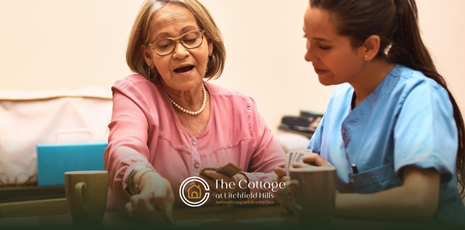9 Activities That Promote Cognitive Health in Seniors

Key Highlights:
- Engaging in mental exercises can slow cognitive decline.
- Social interaction plays a crucial role in brain health.
- Physical activity supports memory and overall wellness.
- Creative hobbies stimulate different areas of the brain.
- Nutrition and lifestyle choices impact cognitive function.
Cognitive health is the foundation of independence, memory, and quality of life in older adulthood. As people age, changes in brain function are natural, but staying mentally active can help slow decline and promote sharper thinking. For seniors, daily activities that stimulate the brain, encourage socialization, and support overall wellness are essential.
In this blog, we’ll explore activities that promote cognitive health in seniors—from games and hobbies to fitness and lifelong learning. These activities not only benefit the mind but also bring joy, purpose, and connection.
Why Cognitive Health Matters for Seniors
Cognitive health refers to the ability to clearly think, learn, and remember. It influences decision-making, problem-solving, and emotional regulation. For seniors, maintaining cognitive health means preserving independence and enjoying daily life more fully.
Without active brain engagement, seniors are at greater risk of:
- Memory loss
- Confusion
- Declining problem-solving skills
- Reduced social interaction
Fortunately, certain lifestyle choices and activities can strengthen brain connections, protect against decline, and keep seniors mentally sharp.
1. Brain Games and Puzzles
Challenging the brain through structured activities is one of the most effective ways to maintain cognitive health.
Examples include:
- Crossword puzzles: Boost vocabulary and recall.
- Sudoku: Improves logical thinking and problem-solving.
- Jigsaw puzzles: Strengthen visual-spatial reasoning.
- Card and board games: Enhance memory and strategic thinking.
Benefits:
- Stimulates different brain regions.
- Improves short-term memory.
- Encourages concentration and focus.
Even 15–20 minutes of puzzles or games daily can make a meaningful impact on brain health.
2. Physical Exercise for Brain Function
Exercise isn’t just for the body—it’s also critical for the mind. Regular movement increases blood flow to the brain and supports the growth of new brain cells.
Recommended activities:
- Walking or light jogging
- Swimming
- Yoga or tai chi
- Chair exercises for seniors with mobility concerns
Benefits:
- Enhances memory and learning ability.
- Reduces risk of dementia and cognitive decline.
- Improves mood by lowering stress and anxiety.
3. Social Engagement
Humans are social beings, and meaningful interaction helps maintain strong cognitive health. Isolation, on the other hand, has been linked to faster decline.
Ways to stay socially active:
- Joining senior clubs or community centers
- Group activities like bingo, art classes, or book clubs
- Regular phone or video calls with family
- Volunteering in the community
Benefits:
- Strengthens communication skills.
- Reduces stress and feelings of loneliness.
- Provides mental stimulation through conversation and new experiences.
4. Creative and Artistic Activities
Artistic expression is more than a hobby—it’s brain therapy. Seniors who engage in creative activities stimulate imagination and problem-solving skills.
Ideas to try:
- Painting, drawing, or crafting
- Playing a musical instrument
- Singing in a choir
- Creative writing or poetry
- Knitting, quilting, or woodworking
Benefits:
- Enhances motor coordination.
- Stimulates creativity and brain flexibility.
- Provides a sense of accomplishment and joy.
5. Lifelong Learning and Mental Challenges
The brain thrives on learning. Seniors who challenge themselves with new knowledge or skills can strengthen neural connections.
Examples:
- Taking classes online or at a local community college
- Learning a new language
- Attending lectures or seminars
- Reading nonfiction books on new topics
Benefits:
- Improves critical thinking and memory retention.
- Keeps curiosity alive.
- Provides structure and purpose.
6. Healthy Nutrition for Cognitive Health
What we eat directly affects brain function. A balanced diet supports memory, attention, and problem-solving.
Brain-boosting foods include:
- Leafy greens (spinach, kale)
- Fatty fish rich in omega-3 (salmon, mackerel)
- Berries packed with antioxidants
- Nuts and seeds
- Whole grains
Foods That Support Brain Health
| Food Group | Examples | Cognitive Benefits |
|---|---|---|
| Leafy Greens | Spinach, kale, collards | Slow age-related decline |
| Fatty Fish | Salmon, tuna, mackerel | Improves memory and learning |
| Berries | Blueberries, strawberries | Protect against oxidative stress |
| Nuts & Seeds | Walnuts, flaxseeds | Supports brain cell communication |
| Whole Grains | Oats, brown rice | Improves focus and concentration |
7. Mindfulness and Stress Reduction
Stress is a major enemy of brain health. Chronic stress can damage memory and impair thinking. Mindfulness practices can reduce stress and sharpen focus.
Examples include:
- Meditation
- Deep breathing exercises
- Gentle yoga or stretching
- Journaling for emotional release
Benefits:
- Improves attention span.
- Enhances emotional regulation.
- Reduces anxiety and depression.
8. Technology and Cognitive Stimulation
Technology can be a great tool for seniors to stay mentally engaged.
Options include:
- Brain-training apps like Lumosity or Elevate
- Virtual classes and workshops
- Video games that require strategy and problem-solving
- Online social groups for interaction
Benefits:
- Convenient access to mental exercises.
- Keeps seniors connected to family and friends.
- Encourages learning new skills through digital platforms.
9. Outdoor Activities and Nature
Spending time outdoors not only benefits physical health but also refreshes the mind.
Examples:
- Gardening
- Birdwatching
- Walking in the park
- Picnics or light hiking
Benefits:
- Improves mood and lowers stress.
- Provides sensory stimulation.
- Encourages physical activity, which supports brain health.
Final Thoughts
Cognitive health plays a vital role in seniors’ quality of life, and it can be nurtured through daily habits and engaging activities. From puzzles and exercise to art, socializing, and healthy nutrition, seniors have countless opportunities to keep their minds sharp and spirits high.
At The Cottage at Litchfield Hills, we believe in creating enriching environments where seniors can enjoy activities that promote cognitive health while building meaningful connections. Our programs are designed to support both the mind and body, helping residents live with vitality and joy. Reach out today!
Frequently Asked Questions
How often should seniors engage in cognitive activities?
Daily engagement, even for 20–30 minutes, can make a big difference in maintaining brain health.
Are group activities more beneficial than individual ones?
Both are valuable. Group activities provide social stimulation, while individual hobbies allow personal focus and creativity.
Can physical activity really improve cognitive health?
Yes. Exercise increases blood flow to the brain, supports memory, and lowers the risk of dementia.
What is the best activity for seniors with limited mobility?
Options like chair yoga, puzzles, reading, or creative hobbies (knitting, painting) are excellent choices.
Do diet and nutrition affect cognitive health?
Absolutely. A diet rich in omega-3s, antioxidants, and whole grains can significantly support brain function.
Sources:
- https://www.health.harvard.edu/mind-and-mood/six-steps-to-cognitive-health
- https://pmc.ncbi.nlm.nih.gov/articles/PMC7990770/
- https://www.utsouthwestern.edu/newsroom/articles/year-2021/exercise-boosts-blood-flow-to-the-brain.html
- https://pmc.ncbi.nlm.nih.gov/articles/PMC9775149/
- https://pmc.ncbi.nlm.nih.gov/articles/PMC2864084/






